Name: Delia Bäckström Symons
Programme: Masters in Child Studies (60 credits)
Year of graduation: 2020
Occupation: Occupational Therapist
Country of origin: Sweden
Tell us about your background. How and why did you choose to study at Linköping University?
I was born in Sweden with a Swedish father and Australian mother in the early 1970’s. We migrated to Sydney, Australia in 1978 where I grew up. I was educated and trained as an occupational therapist. I have always worked with children in community based settings and I have lived and worked in Sydney, the UK and now Melbourne. I now live in Melbourne with my husband and three children.
As a family we had the opportunity to come and live in Sweden for my husband’s work, to live and explore our cultural heritage and give our children an insight into their cultural roots. I took the opportunity to further my education and fulfill a lifelong passion to explore more the field of children and children’s rights. Linkoping University was the right fit for me, offering a course that acknowledged my previous perspective as an Occupational therapist, emphasized working in a transdisciplinary way, with broad yet in depth analysis of subjects as well as instruction in research skills, skills I have been looking to develop.
Tell us a bit about your programme. What did you enjoy about studying here?
Masters of Child Studies is a programme that explores how to study children, delving deeply in to the historical, sociological, anthropological perspectives of studying children and childhood.
The interdisciplinary nature of the programme brought together people with a variety of experiences and perspectives both from their lived experiences but also professionally from around the world. This aspect complimented the content of the program to challenge me to think and analyze research in a different way to what was normal for me. Yet, at the same time, I was able to bring my professional perspective and experience into the course. This aspect of the course, was one of the most enjoyable elements for me, challenging me to think from different perspectives but also relishing in being able to collaborate with people from around the world with different world views.
What was student life like?
Student life was a mix of on-campus periods and collaborating with other students online. The majority of my study was completed in another part of Sweden but as it turned out, we returned to Australia, and at times I was sitting in Australia talking to people studying from for example, Greece, the UK, Ireland, Germany, Finland and of course Sweden. I felt part of a global community.
Do you have any particular memories that stand out?
Being part of a faculty that is active in research and getting a sense of the long history that Sweden is recognized as an advocate of Children’s Rights was inspiring and something I have carried with me in to my daily work.
Where do you work and what do you do at your job?
I work for a not-for profit organization, Gateways Support Services, as a pediatric occupational therapist. We offer therapy and a variety of programs for children, young people and adults with a disability and their families. Our expertise is working with children and families living with autism, intellectual disabilities, developmental delays, challenging behaviours and complex support needs. My role is to support children and families individually as well as developing evidence-based group programs to help develop their skills and help them participate in society as they wish to do. We help and empower people to work towards their individual and family goals, promoting people’s independence and participation in the community.
What is the best, and most challenging parts of your job?
Best: It is a privilege to be able to empathically walk with families through their journey of parenting their children who live with challenges associated with their disabilities. I really enjoy sharing their successes that might appear small to the majority of society but are actually large for the children we work with.
Most challenging: being an advocate for families and a voice for their children to overcome some of the challenges they face against attitudes in society towards people with disabilities. It is rewarding, but also a challenge.
How have your studies at LiU helped you in your career? What has stood out as being the most helpful part?
I have developed research skills which I know are robust and comprehensive that I apply in both my occupational therapy clinical practice, in the development of group program that I am designing, implementing and evaluating. I ensure that throughout this process that the child and young person’s perspective is heard. I hope to be able to employ my research skills further in programs that will have an impact on the lives of children.
Completing a Masters of Child Studies, I felt part of a global community, exploring the one focus of children and childhood and at times feeling the gravity of the topics and the relevance of how studying children and childhood can change the future of children in today’s societies internationally.
Why do you think others should choose to study in Linköping? What do you think is unique about LiU that you can’t find anywhere else?
The interdisciplinary nature of the university and programme. Gathering the minds and experiences of people from around the globe.
What advice do you have for future international students at LiU?
Fika every day. Embrace the Swedish culture, celebrate the traditions and get involved in as many clubs as you can to meet as many local Swedish people. You will have friends for life. I would have loved to take home with me the birch tree forests and blueberry bushes which I used to walk through on my walk through to the university every day that I was on campus.